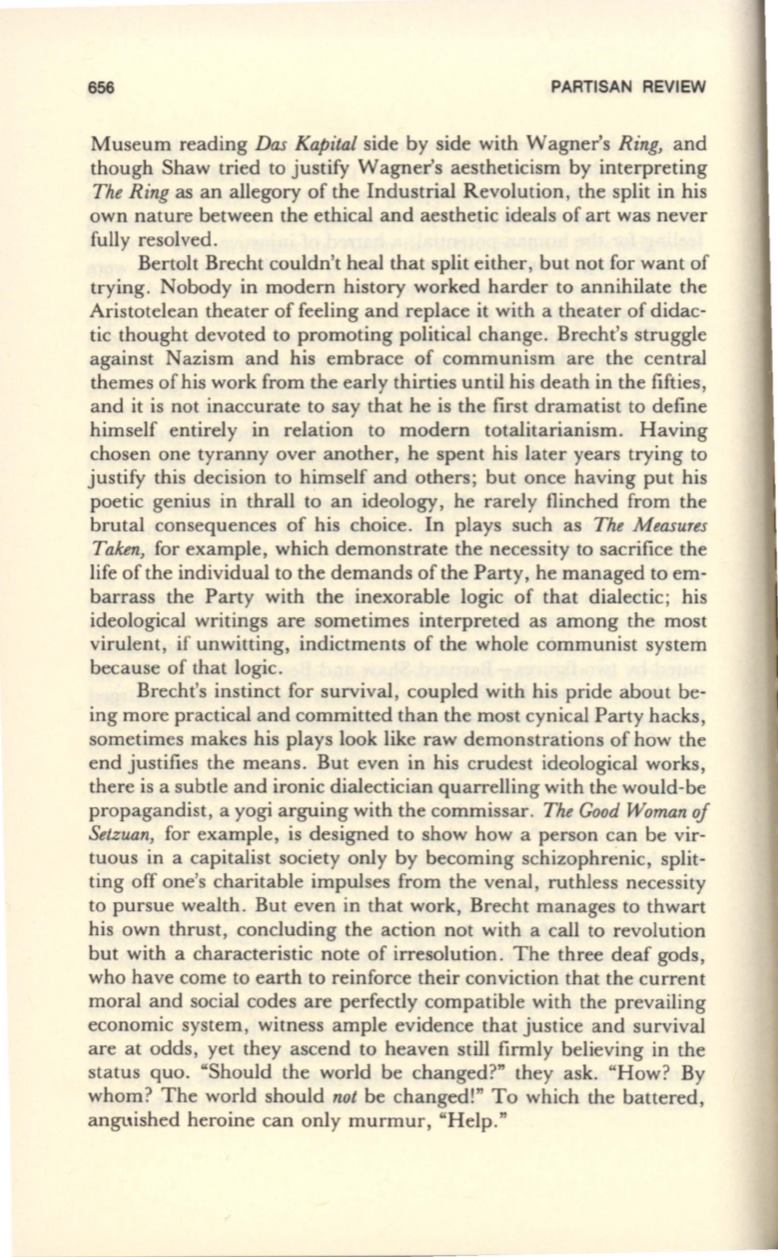
656
PARTISAN REVIEW
Museum reading
Das Kapital
side by side with Wagner's
Ring,
and
though Shaw tried to justify Wagner's aestheticism by interpreting
The Ring
as an allegory of the Industrial Revolution, the split in his
own nature between the ethical and aesthetic ideals of art was never
fully resolved.
Bertolt Brecht couldn't heal that split either, but not for want of
trying. Nobody in modern history worked harder to annihilate the
Aristotelean theater of feeling and replace it with a theater of didac–
tic thought devoted to promoting political change. Brecht's struggle
against Nazism and his embrace of communism are the central
themes of his work from the early thirties until his death in the fifties,
and it is not inaccurate to say that he is the first dramatist to define
himself entirely in relation to modern totalitarianism. Having
chosen one tyranny over another, he spent his later years trying to
justify this decision to himself and others; but once having put his
poetic genius in thrall to an ideology, he rarely flinched from the
brutal consequences of his choice. In plays such as
The Measures
Taken,
for example, which demonstrate the necessity to sacrifice the
life of the individual to the demands of the Party, he managed to em–
barrass the Party with the inexorable logic of that dialectic; his
ideological writings are sometimes interpreted as among the most
virulent, if unwitting, indictments of the whole communist system
because of that logic.
Brecht's instinct for survival, coupled with his pride about be–
ing more practical and committed than the most cynical Party hacks,
sometimes makes his plays look like raw demonstrations of how the
end justifies the means. But even in his crudest ideological works,
there is a subtle and ironic dialectician quarrelling with the would-be
propagandist, a yogi arguing with the commissar.
The Good Woman of
Setzuan,
for example, is designed to show how a person can be vir–
tuous in a capitalist society only by becoming schizophrenic, split–
ting off one's charitable impulses from the venal, ruthless necessity
to pursue wealth. But even in that work, Brecht manages to thwart
his own thrust, concluding the action not with a call to revolution
but with a characteristic note of irresolution. The three deaf gods,
who have come to earth to reinforce their conviction that the current
moral and social codes are perfectly compatible with the prevailing
economic system, witness ample evidence that justice and survival
are at odds, yet they ascend to heaven still firmly believing in the
status quo. "Should the world be changed?" they ask. "How? By
whom? The world should
not
be changed!" To which the battered,
anguished heroine can only murmur, "Help."


